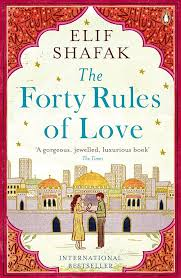Book Review 2024.12: The Forty Rules of Love, Elif Shafak, 350 pages, Paperback, 2011

Reading a blog on Sufism I came across a reference to this book that was highly recommended for its engaging narration of the life of Rumi, the Sufi poet. As an ardent lover of Sufi qawwalis it was impossible for me not to order this book. This book lay in my library for more than a month, before I picked it up three days ago and read it in almost one go. But for the weekend EPL football matches, my other passion, I would have completed it in two days. I wish I had read this book earlier, for it offers a unique insight into life that I believe has tremendously enriched me. Further, it has enriched my understanding of the Sufi qawwalis and helped me appreciate them much better.
The narration in this novel is gripping as it blends the life of an upper middleclass American housewife in the 21st century with the life of Rumi, the 13th century Sufi poet, to highlight that the relevance of Sufism and Rumi is timeless. Organized in short chapters each one of which tells the story through the eyes of different protagonists, the narration helps us see the similarities of challenges across the eight centuries, while at the same time showing the different viewpoints that prevails highlighting the hurdles in living a Sufi life.
While the novel outlines the forty rules of love, in its essence, Sufism is a path of relinquishing our ego or nafs, the soul, by connecting with the universal energy through the medium of love and seeing all that happens to us, both the pleasant and the unpleasant as a process of our internal journey in merging with that universal energy. In this basic thought, I could not see any difference between the Advaita philosophy and Sufism. I would even go to the extent of saying at its core they are the same.
The beauty of this novel is that it introduces abstract philosophical concepts at an appropriate stage of the story to help us see its relevance. Further the narration of short tales interwoven into the novel to highlight a point being made not only makes it interesting, but also helps in making it memorable.
Recommend this book to all those interested in or wanting to know more about Sufism, or Rumi or desiring to examine their own lives though a different lens. My take away from this novel is clear: heaven and hell are places only on this earth; when we love, we see people and the world around us positively and without any ill will irrespective of who they are and what they do, which is heaven, and hell is when greed, anger, lust and fear clouds our vision and we view the world and people around us with apprehension and believe that only we can protect ourselves, rather than trusting the benevolence in nature. With this lens, it is up to each one of us to choose if we want to be in heaven or hell, every minute and every day, for there is nothing else but to live in the present.
Happy Reading and your comments are welcome.

Social Profiles